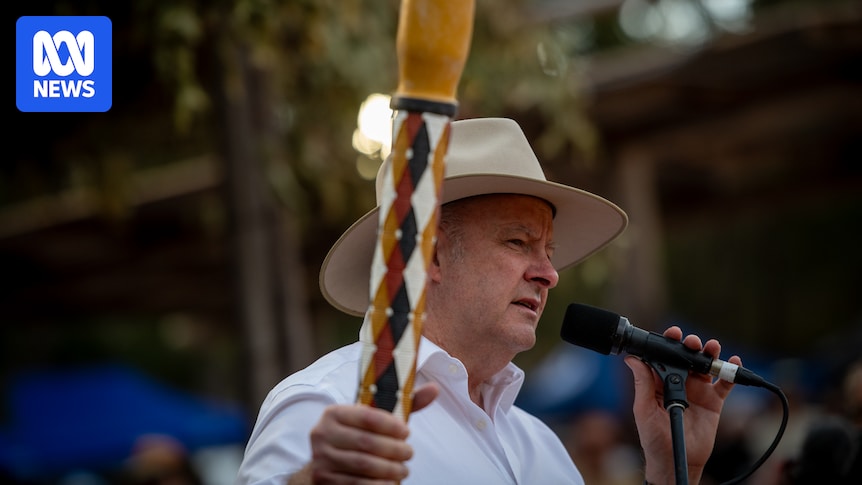Prime Minister Anthony Albanese is set to unveil a plan to lift Indigenous communities out of poverty, saying it’s time First Nations people were supported to “unlock the true potential of their land”.
Mr Albanese is expected to address the Garma Festival in north-east Arnhem Land on Saturday, announcing a new “economic alliance” between the Commonwealth and First Nations people.
The address marks the first significant announcement from the federal government on Indigenous affairs since it swept back into power with an increased majority at the May election.
The broken promise that has loomed over 25 years of Garma
The prime minister will tell Aboriginal leaders gathered at Garma that past policies have cut off First Nations people from “the wealth of their land and waters”.
The Indigenous land estate in Australia is estimated to be around 70 per cent, however, these communities have often been locked out of economic development on their own country, as noted in the recent Yoorrook Justice Commission report.
The government will invest in the First Nations Economic Empowerment Alliance — a partnership between the government and the Coalition of the Peaks, the representative body for more than 80 Aboriginal community-controlled organisations.
“This builds on our commitment to the Closing the Gap Agreement, to its call for a new way of doing business and to the principle of shared decision-making,” Mr Albanese will tell the Key Forum.
“Working with Aboriginal and Torres Strait Islander people right around our nation to boost skills and education, create jobs and back businesses.”
The first announcements under the new partnership are $70 million for First Nations clean energy projects, and $75 million for Native Title reforms.
“This is the tone and the standard we want this partnership to set, from the very start — pragmatic action that brings economic development, ownership and equity to communities,” the prime minister will say.
Labor’s federal Social Services Minister Tanya Plibersek was among the politicians in attendance at Garma this year. (ABC News: Che Chorley)
This will be the second economic announcement Mr Albanese has made at the Garma Festival.
In 2024, in the wake of the failed Voice referendum that had dominated his first term of government, he announced he would be directing his focus to an “economic empowerment” agenda.
But the government is also expected to face questions at Garma over whether it needs to intervene in the Northern Territory, where soaring numbers of Aboriginal people are going to jail and the relationship between the government and Indigenous organisations has deteriorated.
Putting treaty back on the table
With the government now holding a super-majority in the House of Representatives, it is expected that Labor could hold power for successive terms.
Senior leader of the Gumatj clan Djawa Yunupingu says that will be front of mind in his address on Saturday.
“I want to ask the prime minister to work with us, regardless of us losing the referendum. It’s behind us now,” Mr Yunupingu said.
Gumatj leader Djawa Yunupingu wants more consultations between government and First Nations communities. (ABC News: Che Chorley)
“We want you to work for the Yolŋu people, the Aboriginal people from around Australia, look for a better way.”
The federal government abandoned any plan for a Makarrata Commission for national truth-telling and treaty in its last term but Mr Yunupingu says he wants to reopen the conversation.
“Treaty and Makarrata and the truth telling is yet to be decided, it is yet to be talked upon or talked amongst like we did for the Uluru Statement,” Mr Yunupingu said.
“It will start here and maybe go on for the next couple of years. [The] prime minister will still be in power and we need to have the discussion with him and his cabinet.”
Opposition leader absent from Garma
Opposition Leader Sussan Ley is not attending the Garma Festival this year, instead opting to visit the Kimberley region in Western Australia with Shadow Indigenous Australians Minister Kerrynne Liddle.
In a statement, Ms Ley accused Mr Albanese of “stepping back” from Indigenous affairs since the referendum was lost.
Sussan Ley will not be attending Garma this year and will instead be visiting Indigenous communities in northern WA during the festival period. (ABC News: Kenith Png)
“The prime minister traded in the politics of hope and made a number of promises to Indigenous Australians. On many measures these are promises he has not delivered. His referendum failed and we have seen worsening outcomes in critical areas. So what is his plan?” Ms Ley said.
“It is not good enough to just give speeches at festivals, we need to see his plan.
“Since the Voice Anthony Albanese has stepped back from Indigenous issues, that is not good enough. He led the referendum process, a process which was unsuccessful. So what is his path forward?”
The Coalition has not announced any policies for Indigenous affairs since the election, but ran with a 10 point plan to deliver practical outcomes for First Nations peoples, including an audit into Indigenous spending, a royal commission into sexual abuse in Indigenous communities, and reforming land councils for economic development.
The shadow Attorney-General Julian Leeser is the sole representative for the federal Coalition in attendance at the festival.

